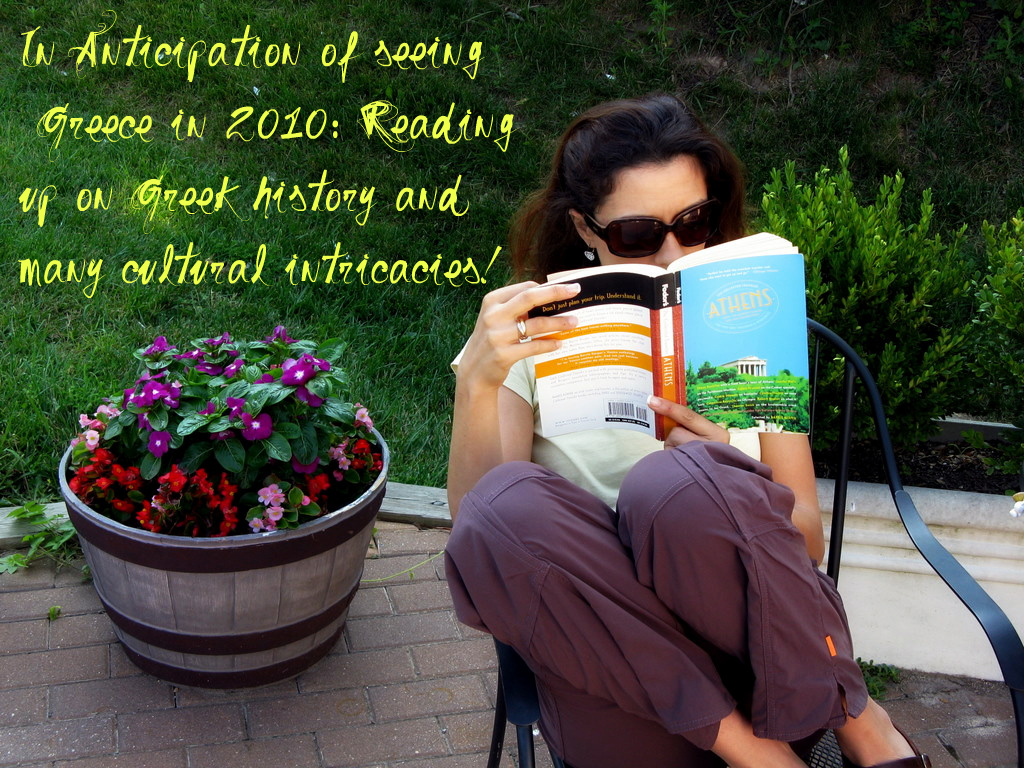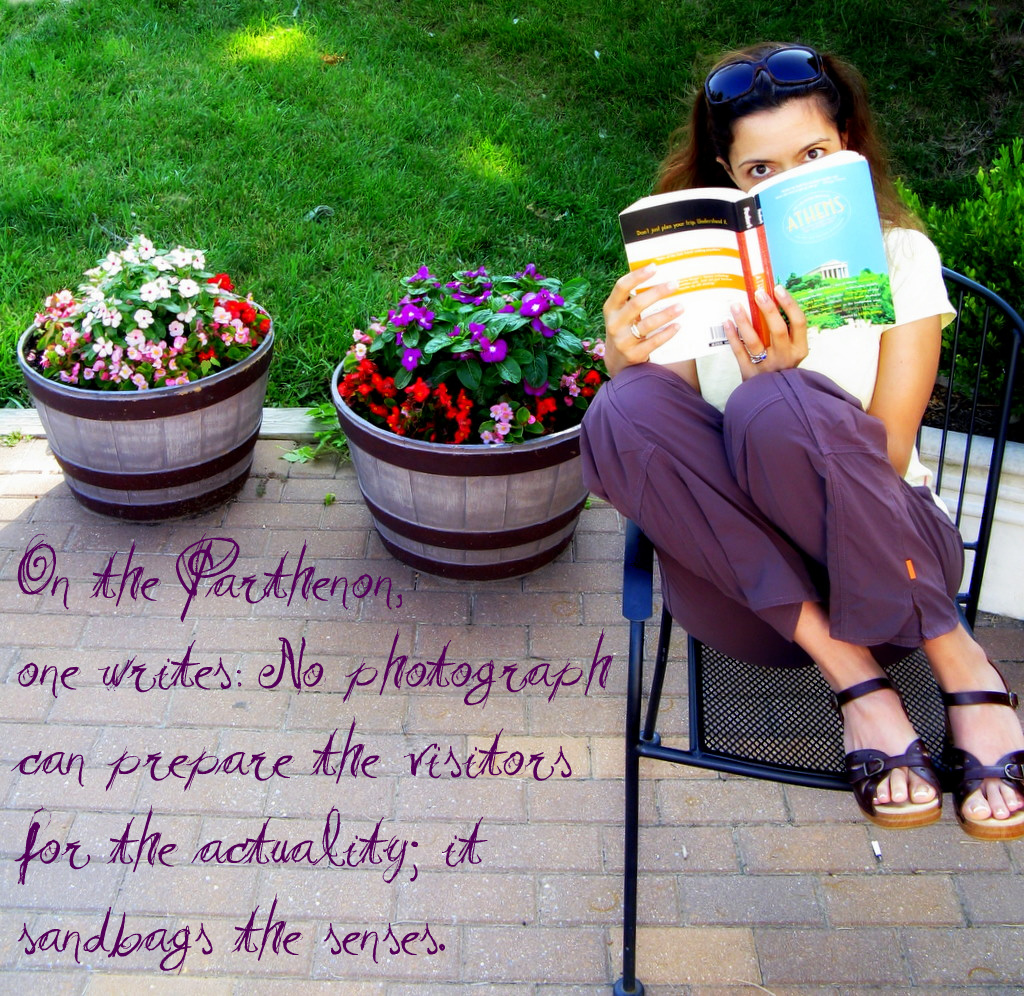
I distinctly remember my dad constantly begging us to take a trip to Athens, Greece, when we lived in Turkey with my family for 3 years in the 1980s after we had left Iran. For some inexplicable reason, the whole family was against going anywhere else. Perhaps the unexpected move from Iran had left us in need of a landing zone, perhaps we were too preoccupied at that difficult juncture in our lives anyway to appreciate what Greece could offer . To this day, I have wondered what it would have been like to see the Parthenon at the age of 12.
Now, many years later and after becoming a world travel addict, I am planning to visit Greece for the first time, and I am grateful that, among other things, the magnificence of Parthenon remains undiminished for me to see.A dear friend loaned me this book for what turned out to be a fascinating read. It is a 2004 copyright edition, but the stories and essays of many sections first appeared in publication some years ago, so the perspectives into Greece (and Athens primarily) not only span across many authors, but also across many decades in the life of Greece.
From the most popular singular attraction of all Athens – the Parthenon- to the Greek’s vehemence of the Turks for taking over their beloved Constantinople, from the the times of Byzantine empire to the Turks stealing the worshipped Hagia Sofia, from the Greek’s love of olive oil and good company to the gossip and games that fill the streets of Athens, from recipes for the best local dishes to the night life and escape zones of the island life, from the voice of tourists, frequent travelers, local residents of Greece, and the very Greek, you will read about it all in this well-written collection of travelers of Athens (and Aegean islands).
My all-time favorites in this book are essays accounting Greek history from the time of Byzantine empire to the Turkish invasion and the rebuilding of Athens. The Byzantine empire which ruled over Constantinopole fell to Ottoman Turks on Tuesday, May 29,1453 – a reason to this day which all Greeks consider Tuesdays to be an unlucky day – for business or other important matters. The Turks invaded Constantinople and renamed it Istanbul years later. The most painful loss to this day for the Greeks remains the Hagia Sofia, a beloved Greek Orthodox church which was turned into a Mosque at the hands of Turks. My Dad tells me we went to visit the Blue Mosque (as the Turks call their now beloved Ayasofiya) while living in Istanbul, and a shame that I do not remember at all. The passage of time is brutal on our memories at times, especially as it must have been magnificent.
As one traveler puts it, “Even today, stripped of its gold and silver, and with frescoes faded and begrimed, there is arguably no building in all the world whose interior conjures up such a sense of boundless wealth and mystical power.” (pg.160)

I learned that while the Parthenon and the return of the marbles from London are a hot topic of debate world over today, it does not concern the average Greek as much – but God help you if you call Constantinople by any other name, especially Istanbul! The words megali ithea – great idea, allude to the notion of hope and desire of Greek people to someday restore all of Greece’s stolen land from its greatest historical moments, Istanbul at the top of that list. It is a notion that no doubt plants seeds of hope in vain but alas, bitter history cannot be swallowed easily without some hope for a future miracle. 1922 was a year of despair for the Greeks when Ataturk kicked out 1.25 million Greeks back into Greece and officially ended 3000 years of Greek civilization when Smyrna became Turkey’s coastal city of Izmir.
Reading is the best pastime for an active mind! If you like to see the other book reviews, check the index of In Print.
Patricia Storage goes into magnificent details on not just the history of Athens but also the cultural, literary, traditional evolution of it during the last few centuries. I especially love the overture of history covered with the secrets of hidden city Athens. The shock that in 1827, in its fight with the Turks, the city was left with 60 standing houses and soon after the unwanted Greeks are sent from Turkey to live in Athens. Certainly much has been built to house the new sudden population, although it is amusing to note that today in Greece, if a construction site uncovers any part of old Athens underneath, all bets are off and the site is preserved for eternity. Athens digging up its old self for preservation. I certainly do not question Patricia’s brilliant choice of residence.
The Aegean islands are covered through some beautiful essays in as much detail as one could ask for. I selectively chose my way through some islands of interest, Santorini, Crete, Nisiros, and Rhodes among a few. I enjoyed reading two essays on Santorini , and learned about the 1450 volcano eruption where 2/3 of the island disappeared. The theory goes that Santorini was the legendary Atlantis, the richest and earliest civilization that was destroyed by volcano. Amazing. And perhaps there is some justice in the history of Greece when Mussolini spent a fortune of Italy’s tax money rebuilding the island of Rhodes – which is promptly given back to Greece in 1947.
What travel book doesn’t talk about food? There are countless essays here on how to find and enjoy food in Greece. While the information on all the restaurants needs to be validated, the tidbits are fun. Eating yogurt and honey for breakfast – the food for the Gods. Dipping everything and anything into olive oil, and no other oil – in fact, butter is extinct in Greek cooking. Feta being the delicious cheese from goats, and the low fat king of cheese to boot. Fish is like fruit to the Greeks, so light and healthful they say, you can enjoy it even when you are full! And most of all, visit ouzero bar in Athens – a place with bite size delicious plates, eaten at the bar. And as it rings true for many other wonderful places, it is freshness more than anything else that explains the taste of divine food in Athens.
The essay by Alan Brown takes us to the other side of Athens – the inner life, the night life of Athenians – oh what we Americans are missing he says – Greeks the conversationalists with opinions on everything. He takes us through his experience of Kolonaki neighborhood, its shops and its aristocratic residents, outdoor cafes and real Kafeneia (coffee shops – Greek style). He shares with us the views of Psiri, a meat/fish market by day and unrecognizable by night with dancing, bars, music, cafes, conversation and life.
I am a fervent believer of getting to know a country and its history before a visit. This is not so you know the top attractions and the best local place to avoid tourist traps. It is to do due diligence on getting to know a country beyond its facade, to learn of the past it has endured, of the people and the traditions it has born, and to identify with it on some level – as we are all human beings in a very small planet – before you set eyes on the place.
And if that place is Athens, if you remember one thing, remember to “Never trust your first impressions of Athens” – Blaring radio, chaotic traffic, compressed spaces and loud people. Dig deeper and you will find the real Athens to love and admire and where you will come to see the importance of the permanent, rather than the fleeting.
 I am Farnoosh, the founder of Prolific Living. So glad you are here. My mission is to empower you to unblock your creative genius to live your dream life.
I am Farnoosh, the founder of Prolific Living. So glad you are here. My mission is to empower you to unblock your creative genius to live your dream life.